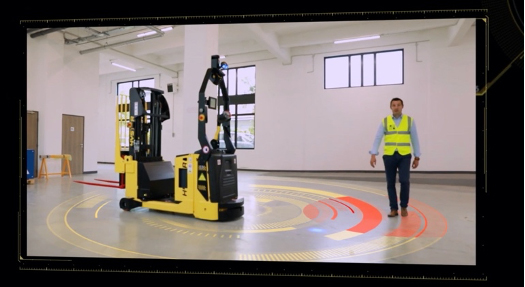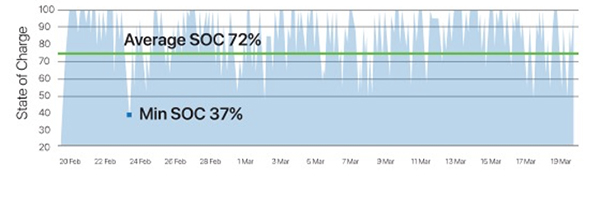With efficiency a top priority in the industry, the use of Li-ion batteries in forklifts can help provide a boost to the bottom line.
Demand and growth in Food and Beverages industry are driven by food consumption and population growth, while profitability is driven by operation efficiency. Changing consumer behavior, dramatically instigated by the pandemic in 2020, sets new requirements for the logistics and supply chain, arguably at a speed that many industry providers are not prepared for.
Food and beverage is a very diverse industry and fragmented, but the “efficiency drives profitability” mantra is quite common for all of its parts.
On-demand availability, timely home delivery, locally sourced fresh produce, supply chain transparency – these trends require technological innovations in moving products through the supply chain to increase efficiency and maintain the highest standards for hygiene and food safety. This is how food logistics is becoming the key to success in the industry.
With efficiency at the forefront throughout the industry, the use of lithium-ion batteries in forklifts can help provide the essential boost in the final accounting.

Adoption of AGVs / AMRs (autonomous guided vehicles / autonomous mobile robots) and automation of the warehouses are one of the most prominent trends in the strive for higher efficiency. We have recently published an article on why AGVs and Li-ion Batteries are Match Made in Heaven. Single battery operation, zero daily maintenance, and flexible opportunity charging (with wireless charging on the horizon) mean that forklifts may operate largely uninterrupted through multiple shifts. This trend also helps to mitigate the acute risk of labor shortage.
Better material handling equipment utilization is achieved with a higher uptime and data transparency. Daily analytics of data from every Wi-Fi-enabled battery management system (BMS) keeps track of individual truck performance, energy use and battery health. Predictive and remote upgrades and maintenance further decrease downtime.
Low total cost of ownership of lithium batteries for electric forklifts compared to both internal combustion engines and lead-acid batteries have been proven over time in multiple applications of forklifts in the Food and Beverage production and distribution.
Top hygiene and safety standards of handling Food and Beverage products include both cleanliness of the facility and air quality. These requirements essentially make obsolete the lead-acid technology with its hazardous acid spills and fumes, whereas lithium batteries produce zero pollutants.
Outdoor farming and food rendering plants put the most stringent requirements on the batteries, often used in diverse harsh conditions including extreme temperatures.
OneCharge offers sealed lithium batteries to keep out dust and condensation. This offer is a key solution for both outdoor forklifts in agricultural applications and indoor rendering of meat, poultry, and fish, where moisture would otherwise compromise the battery condition.
Industrial lithium batteries for lift trucks and forklifts continue to serve as an enabling technology for the key megatrends in material handling.
Fruit and Wine Producer
An example of this efficiency in action can be found at fruit producer Allan Brothers Inc., the company which recently installed the world’s biggest fruit packing line.
Allan Brothers switched to lithium ion batteries for its forklifts in order to avoid the construction of a new battery storage room necessary with lead acid battery power, saving close to half a million dollars.
Food and Beverage Producer
In beverage production, equipment is often needed to handle extra-heavy loads.
Illustrating how lithium ion batteries can meet this challenge, one leading U.S. beverage producer reports, that switching to OneCharge MAX POWER Series Li-ion allowed for the use of a single battery per truck across three shifts of daily operations.

This included 19 hours per day across 3 shifts, moving 3,500-pound pallets of bottled soda using 4-wheel, sit-down 80V lift trucks with single/double attachments. BMS data showed there is still enough power left at the end of the day to deal with potential peaks or emergencies.
Dairy Producer
One of the nation’s top dairy and ice cream producers provides an illustration of Li-ion technology use in temperature-controlled warehouses. The company, which owns 13 manufacturing plants throughout the U.S., runs multi-shift warehouse operations in temperatures ranging from -30 to 70°F.
One of the company facilities has switched to Yale trucks powered by OneCharge FROST batteries, which effectively ended a cumbersome process of charging batteries midway through the second shift of operations due to lost power in the cold temperatures.
Some lift trucks work predominantly inside the freezer (-20°F) and are powered by OneCharge FROST II batteries. Other trucks operate in a cooler environment (+30°F) and use OneCharge FROST I batteries. The rest of the fleet is powered by regular OneCharge batteries at an ambient temperature of +70°F.
The FROST I forklift batteries offer insulated cells, allowing forklifts to make trips in and out of a freezer. The FROST II batteries feature a thermostat-controlled heater located below and around the cells, and the pack is insulated.
Here’s a recap of the benefits lithium-ion batteries can offer to those in the food and beverage industry to achieve higher profitability through higher efficiency of their material handling operations:
For more information about OneCharge, and how lithium-ion can assist your food and beverage operation, visit www.onecharge.biz.
Scott Ellyson, CEO of East West Manufacturing, brings decades of global manufacturing and supply chain leadership to the conversation. In this episode, he shares practical insights on scaling operations, navigating complexity, and building resilient manufacturing networks in an increasingly connected world.